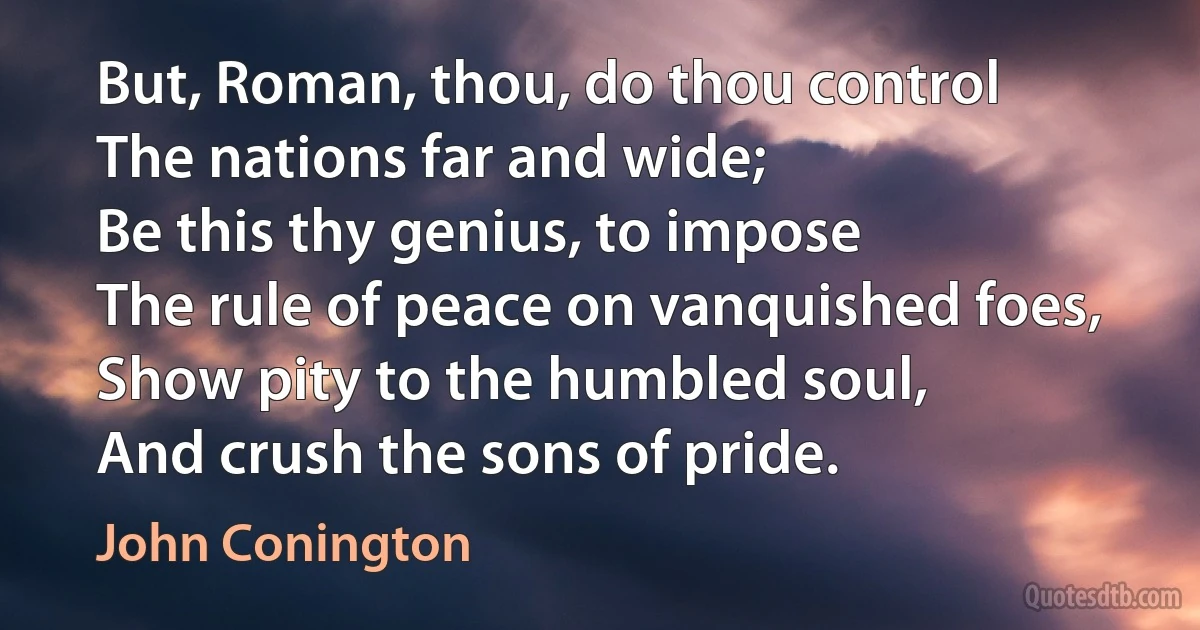Wide Quotes - page 36
Taylor....Benjani coming in..........OHHHHH, HOW ABOUT THAT! A bullet of a header; Totally out of the blue - It's Portsmouth 1, Manchester United 1! Utaka did well...forcing it wide, Taylor with an in cross, Benjani coming from a deep position; wasn't picked up.....he launched himself at it....1-1. No one could see that coming....and no one saw Benjani coming.

Jonathan Pearce
We have a wide divide between classes and we have a wide divide between cultures because we're from different tribes, we have different religions. You don't have to walk very far to see someone who has a really different life from you...I wouldn't want to write a novel and people feel that I'm speaking to a Nigerian experience – I'm speaking to my experience, to the things I'm interested in, and that's all I can do.

Oyinkan Braithwaite
Halfway down a by-street of one of our New England towns stands a rusty wooden house, with seven acutely peaked gables, facing towards various points of the compass, and a huge, clustered chimney in the midst. The street is Pyncheon Street; the house is the old Pyncheon House; and an elm-tree, of wide circumference, rooted before the door, is familiar to every town-born child by the title of the Pyncheon Elm.

Nathaniel Hawthorne
In the depths of every heart, there is a tomb and a dungeon, though the lights, the music, and revelry above may cause us to forget their existence, and the buried ones, or prisoners whom they hide. But sometimes, and oftenest at midnight, those dark receptacles are flung wide open. In an hour like this, when the mind has a passive sensibility, but no active strength when the imagination is a mirror, imparting vividness to all ideas, without the power of selecting or controlling them then pray that your grieves may slumber, and the brotherhood of remorse not break their chain.

Nathaniel Hawthorne
Before the Internet, before BBSes and Fidonet and Usenet and LiveJournal and blogs and Facebook and Twitter, before the World Wide Web and hot-and-cold-online-everything, science fiction fandom had a long-lived, robust, well-debugged technology of social networking and virtual community.

Patrick Nielsen Hayden
I notice that you use plain, simple language, short words and brief sentences. That is the way to write English - it is the modern way and the best way. Stick to it don't let fluff and flowers and verbosity creep in. When you catch an adjective, kill it. No, I don't mean utterly, but kill most of them - then the rest will be valuable. They weaken when they are close together. They give strength when they are wide apart. An adjective habit, or a wordy, diffuse, flowery habit, once fastened upon a person, is as hard to get.

Mark Twain
A job competency is an underlying characteristic of a person in that it may be a motive, trait, skill, aspect of one's self-image or social role, or a body of knowledge which he/she uses. The existence and possession of these characteristics may or not be known to the person. In this sense, the characteristics may be unconscious aspects of the person. Because job competencies are underlying characteristics, they can be said to be generic. A generic characteristic may be apparent in many forms of behaviour, or a wide variety of different actions.

Richard Boyatzis
As a man exhibits himself in physical forms and actions, so there is one other Spirit, a great, wide, mighty, infinite, eternal Spirit back there in the depths of space, and in the present, and in the future, and in the abysses of space, who at His will wrestles into existence great globes, and keeps them in their position. He builds them, and places on them these mysterious forms of earth which are signals hung out over these abysses to tell coming spirits who He is, what He is, what He does, how high is His throne, and how vast is His power from eternity to eternity, from infinity to infinity through all ages of all time; He is holding forth to men and angels these external tokens of His almighty power, of His infinite skill, and of His everlasting love.

Randolph Sinks Foster
Graphical design notations have been with us for a while... their primary value is in communication and understanding. A good diagram can often help communicate ideas about a design, particularly when you want to avoid a lot of details. Diagrams can also help you understand either a software system or a business process. As part of a team trying to figure out something, diagrams both help understanding and communicate that understanding throughout a team. Although they aren't, at least yet, a replacement for textual programming languages, they are a helpful assistant... Of these graphical notations, the UML's importance comes from its wide use and standardization within the OO development community. The UML has become not only the dominant graphical notation within the OO world but also a popular technique in non-OO circles.

Martin Fowler
Anyway, the trick is simply this: No matter what happens, keep your heart open. Wide open. The heart is made of love, and love is indestructible, and only the arrogance of ego would presume that it requires protection. To open your heart is to reduce your ego, and this is the only magic that is ever required to experience the naked truth.

Tony Vigorito
Wherever they found magnificent temples of the Hindus ever since the establishment of Sayyid Salar Mas'ud Ghazi's rule, the Muslim rulers in India built mosques, monasteries and inns, appointed mu'azzins, teachers, and store-stewards, spread Islam vigorously and vanquished the Kafirs. Likewise, they cleared up Faizabad and Avadh, too, from the filth of reprobation (infidelity), because it was a great centre of worship and capital of Rama's father. Where there stood the great temple (of Ramjanmasthan), there they built a big mosque, and where there was a small mandap (pavilion), there they erected a camp mosque (masjid-i-mukhtasar-i-qanati). The Janmasthan temple is the principal place of Rama's incarnation, adjacent to which is the Sita ki Rasoi. Hence, what a lofty mosque was built there by king Babar in AH 923 (AD 1528) under the patronage of Musa Ashiqan! The mosque is still known far and wide as the Sita ki Rasoi mosque. And that temple is extant by its side.

Babur



